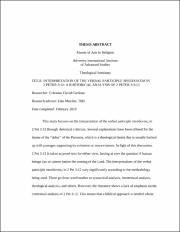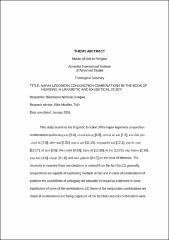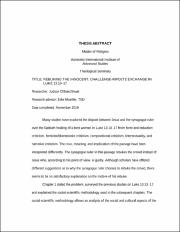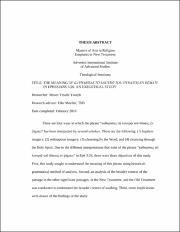Search
Now showing items 11-16 of 16
Interpretation of the verbal participle Speudontas in 2 Peter 3:12 : a rhetorical analysis of 2 Peter 3:3-13
(Adventist International Institute of Advanced Studies, 2018-03)
This study focuses on the interpretation of the verbal participle σπεύδοντας in 2 Pet 3:12 through rhetorical criticism. Several explanations have been offered for the theme of the “delay” of the Parousia, which is a ...
Hapax legomena conjunction combinations in the book of Hebrews : a linguistic and exegetical study
(Adventist International Institute of Advanced Studies, 2016-01)
This study examines the linguistic function of the hapax legomena conjunction
combinations (καθώσπερ καὶ [5:4], εἰ καὶ οὕτως [6:9], επειτα δὲ καὶ [7:2], καὶ ὧδε μὲν . .
. ἐκεῖ δὲ [7:8], oθεν καὶ [7:25], καὶ εἰ μὲν [11:15], ...
Rebuking the innocent : challenge-riposte exchange in Luke 13:10-17
(Adventist International Institute of Advanced Studies, 2019-11)
Many studies have explored the dispute between Jesus and the synagogue ruler over the Sabbath healing of a bent woman in Luke 13:10–17 from form and redaction criticism, feminist/liberationist criticism, compositional ...
The Meaning of katharisas to loutro tou hydatos en remati in Ephesians 5:26 : an exegetical study
(Adventist International Institute of Advanced Studies, 2016-02)
There are four ways in which the phrase ―θαζαξίζαο ηῷ ινπηξῷ ηνῦ ὕδαηνο ἐλ ῥήκαηη‖ has been interpreted by several scholars. These are the following: (1) baptism imagery, (2) redemption imagery, (3) cleansing by the Word, ...
Inauguration or Day of Atonement : the cleansing of the heavenly things in Hebrews 9:23
(Adventist International Institute of Advanced Studies, 2019-02)
Honor and shame : an exegetical-thematic analysis of the narrative of Hagar and Sarai in Genesis 16
(Adventist International Institute of Advanced Studies, 2015-11)
The purpose of this study is to ascertain the identity of honor and shame values in
Gen 16. The narrative presents nuances of honor and shame particularly in verse 4 and
clause in verse 13b. Most scholarly discussions ...






